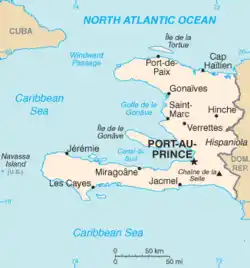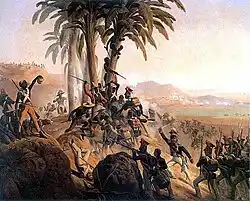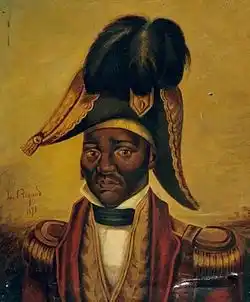
Haitian surnames are the surnames held by the eleven and a half million people who live in the country of Haiti on the western side of the island of Hispaniola in the Caribbean, as well as Haitians abroad in other parts of the West Indies and countries like the United States. These surnames are closely connected to the history of slavery in Haiti. This was a French colony in the seventeenth and eighteenth centuries. As a center of French sugar cane cultivation huge numbers of African slaves were transported to the colony. These did not have surnames for much of this period, however following the Haitian Revolution of the 1790s many former slaves began adopting surnames. However, unlike in the United States and the British colonies of the Caribbean, where former slaves tended to adopt the surnames of their former owners or a benefactor, in Haiti former slaves typically used a Francophone first name as a surname. As a result, in Haiti today a great many people have surnames like Jean, Pierre and Louis.
History of Haitian surnamesHistory of Haitian surnames
The surname landscape of Haiti has been shaped by the rather unusual colonial history of the island of Hispaniola. This was one of the first places discovered by the Spanish in the 1490s. They quickly established one of their most significant colonies on the eastern side of the island in what is now the Dominican Republic. In an unusual development, the island eventually ended up being split into two spheres of colonial jurisdiction after the French began establishing their own colonies on the western side of the island in the early seventeenth century. They named this Saint-Domingue, though it is known today by the native Taino name, Haiti, meaning ‘the land of the high mountains’. The Spanish retained control of the central and eastern parts of the island, which would eventually become the Dominican Republic.[1]

In the seventeenth and eighteenth centuries Saint-Domingue became one of the main centers of the booming sugar cane industry in the Caribbean. It is hard to understate the extent to which the production of sugar for the European market drove the Transatlantic slave trade in the early modern era. An estimated 800,000 slaves were trafficked to Saint-Domingue alone to provide labor on the French sugar cane plantations here, more than twice the overall figure for the Thirteen Colonies of North America and the subsequent United States.[2] This meant that there was an enormous slave population in Saint-Domingue by the time that the Haitian Revolution broke out in 1791. Taking advantage of the disturbances wrought in French colonial rule by the French Revolution back home in Europe, the slaves of Haiti rose up and over the course of a protracted struggle that lasted down to the mid-1800s managed to establish the first independent black-dominated state in the Americas.[3]
Slavery was quickly abolished by the Haitian revolutionaries in the 1790s. By then there were already many freed slaves in the colony of Saint-Domingue, which would soon become officially known as Haiti, but the abolition of slavery created a vast number of newly freed citizens. As elsewhere, this created a social and administrative problem. While enslaved, many slaves did not have surnames, as they were not deemed necessary, though such was the size of the sugar cane plantations in Saint-Domingue that some slave-owners had imposed surnames already to aid in recording and identifying their slaves. This process accelerated in the revolutionary period.[4]
Haitian naming conventionsHaitian naming conventions
The pattern of surname development mirrored areas of British colonization in the Americas to a considerable extent in so far as many former slaves adopted elements of the naming conventions of the colonial power. However, where in places like the United States and Jamaica slaves adopted the surname of their owners or of a benefactor of some kind, in Saint-Domingue/Haiti the practice was to adopt French given names or first names as surnames. Thus, in the course of the eighteenth and nineteenth centuries names like Jean, Louis, Augustin, Michel and Francois became the most common surnames amongst former slaves there. And because Haiti’s large population for such a small country is overwhelmingly comprised of people who are descended from slaves, these names have become the primary basis for Haitian surnames.
One caveat is that a proportion of the Haitian population are descended from the French colonials and so we also find more traditional French surnames in Haiti such as Laguerre, Moreau and Lacroix, albeit they are less common. These conventions have also resulted in some rather unusual surnames such as Caesar, Brutus and Demosthenes, reflecting the early modern tendency to give slaves names derived from classical Greek and Roman history, or names like Voltaire and Napoleon which were commentaries on political and societal developments back home in France during the eighteenth century.[5]
Most popular Haitian surnamesMost popular Haitian surnames
The most popular Haitian surnames are as follows:
- Jean – The most common Haitian surname. Over 650,000 Haitians, or one in sixteen out of the country’s eleven and a half million people, have this surname.
- Pierre – The second most common, with over 620,000 holding this surname.
- Joseph – Over half a million Haitians hold this, the third most common surname in the country.
- Louis – There is a steep decline in the number of people with the fourth most common surname. Just over 270,000 people are called Louis in Haiti, nearly half the size of the third most common surname.
- Charles – Nearly quarter of a million Haitians have Charles as their surname, the fifth most common in the country.
- Francois – The sixth most common surname in Haiti. Approximately 140,000 people have this surname.
- Paul – Either the seventh or eighth most common Haitian surname, with roughly 115,000 people holding it.
- Michel – An almost identical amount of people in Haiti have Michel as their surname as do Paul.
- Etienne – The ninth most common surname in the country is Etienne, with approximately 95,000 people having this surname.
- Augustin – The tenth most common surname in Haiti, held by nearly 90,000 people.
Overall these ten surnames account for nearly three million Haitians, over a quarter of the total population.[6]
Famous HaitiansFamous Haitians

- Toussaint Louverture – One of the leaders of the Haitian Revolution from 1791 onwards. His legacy is controversial though, as he was a substantial slave-owner himself in Saint-Domingue prior to the Revolution but after earning his own freedom in 1776.[7]
- Jean-Jacques Dessalines – After the Haitian Revolution he established himself as Emperor Jacques I of a Haitian Empire, a position he held from 1804 until his assassination in 1806.[8]
- Wyclef Jean – A founding member of The Fugees in the 1990s, he subsequently attempted to run to become President of Haiti in 2010 but was blocked from doing so on the basis that he had not been resident in Haiti for many years.[9]
- Garcelle Beauvais – A very well-known Haitian actress, she starred in Coming to America (1988) and shows like NYPD Blue and The Jamie Foxx Show.[10]
See alsoSee also
Explore more about Haitian surnamesExplore more about Haitian surnames
- The Haitian Revolution at English Heritage
- How Haiti Destroyed Slavery and Led the Way to Freedom at Public Books
- Caribbean, Births and Baptisms, 1590-1928 record collection on MyHeritage
- Caribbean, Marriages, 1591-1905 record collection on MyHeritage
- Caribbean, Deaths and Burials, 1790-1906 record collection on MyHeritage
References
- ↑ Alex Dupuy, ‘French Merchant Capital and Slavery in Saint-Domingue’, in Latin American Perspectives, Vol. 12, No. 3, Repression and Resistance (Summer, 1985), pp. 77–102.
- ↑ https://slaveryandremembrance.org/articles/article/?id=A0111
- ↑ Laurent Dubois, Avengers of the New World: The Story of the Haitian Revolution (Cambridge, Massachusetts, 2005).
- ↑ Philippe Girard, ‘What’s in a Name? Slave Trading during the French and Haitian Revolutions’, in The William and Mary Quarterly, Vol. 76, No. 4 (October 2019), pp. 763–796.
- ↑ https://forebears.io/haiti/surnames
- ↑ https://surnam.es/haiti
- ↑ https://nmaahc.si.edu/latinx/toussaint-louverture
- ↑ https://www.biography.com/political-figures/jean-jacques-dessalines
- ↑ https://www.blackpast.org/african-american-history/nel-ust-wyclef-jean-1969/
- ↑ https://www.imdb.com/name/nm0004731/bio/

